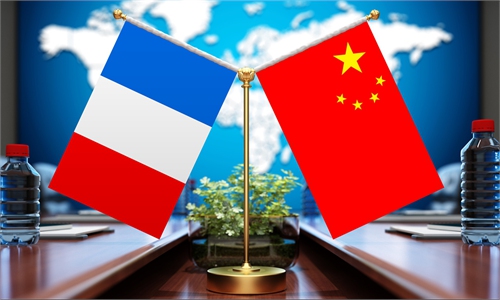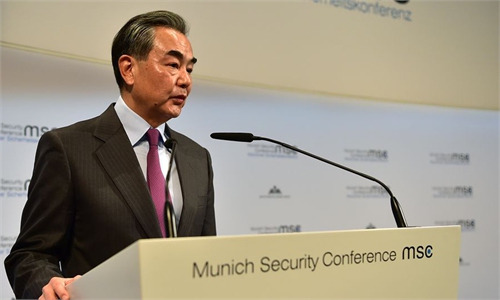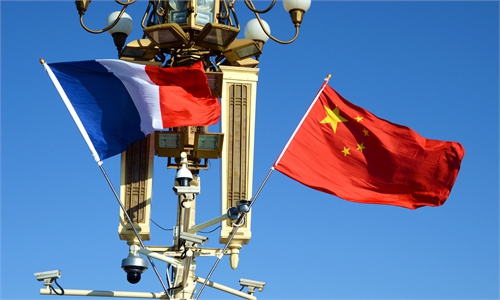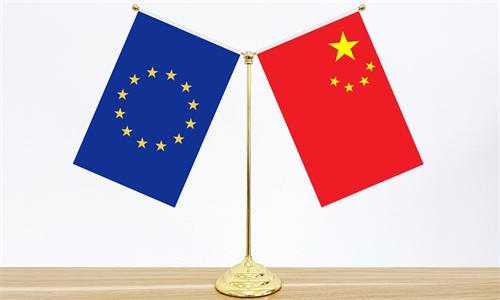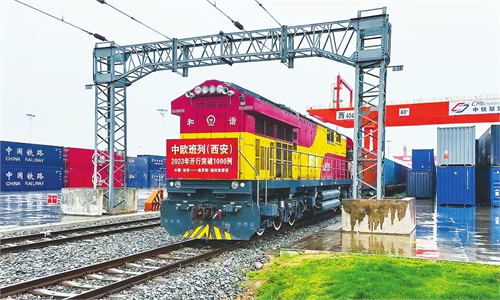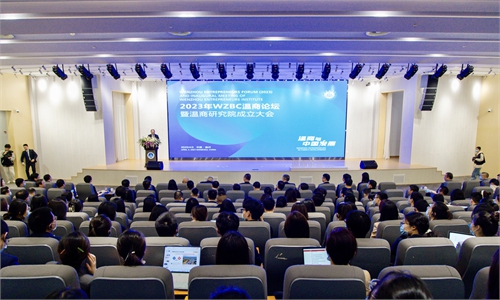Macron, Von der Leyen to visit China in intensive China-EU interactions
Both sides should overcome US interference, focus on cooperation
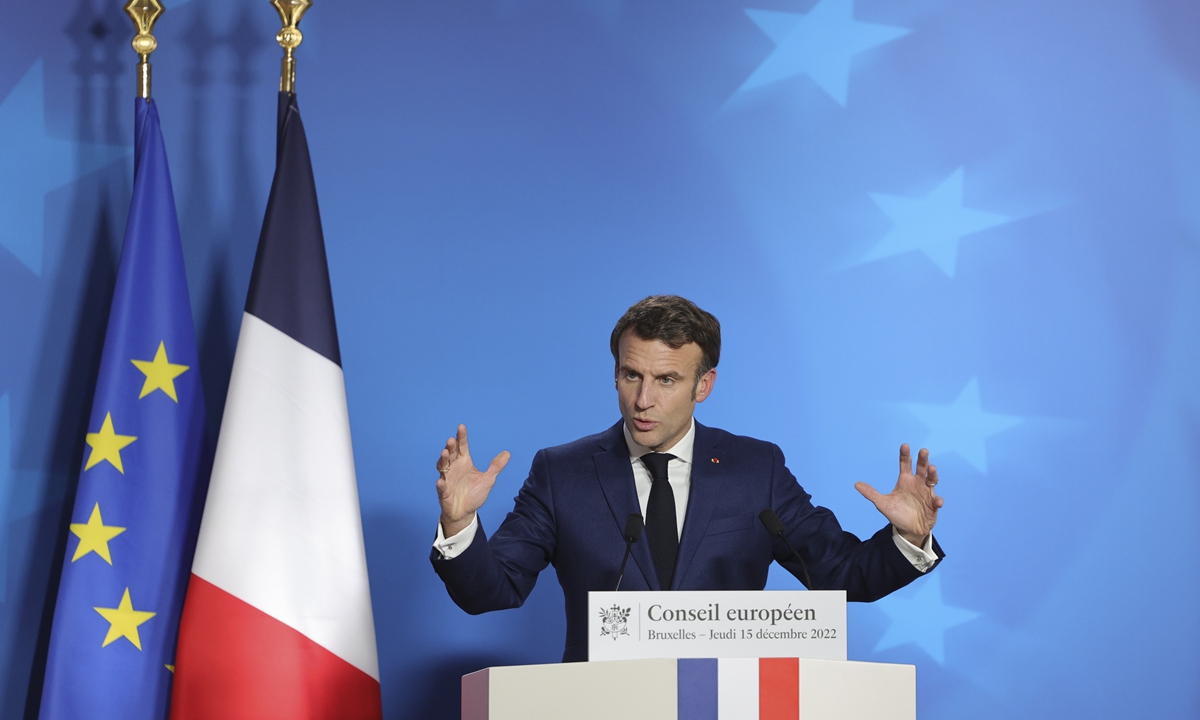
French President Emmanuel Macron speaks at an EU summit in Brussels on December 15, 2022. Photo: VCG
The intense China-EU interactions highlighted a consensus shared by China and the EU that the two sides should enhance substantial in-person communication and exchanges to promote mutual understanding amid vast changes in the international landscape, according to observers.
It is an urgent task for China and the EU to overcome external interference and some internal noises, focus on pragmatic areas in bilateral relations and jointly seek a stable and healthy development of the relationship, injecting positivity and certainty into a turbulent world, observers said.
As China has proposed a 12-point peace plan for resolving the Ukraine crisis, the EU should be encouraged to exercise its diplomatic autonomy, and instead of pressuring China and being hijacked by the US, it should take control of its own destiny to act in a way conducive to ending hostilities and promoting ceasefire for Europe's own sustainable peace and security, they noted.
Enhancing understanding
At the invitation of Chinese President Xi Jinping, Macron will pay a state visit to China from April 5 to 7, Foreign Ministry spokesperson Hua Chunying announced on Monday.
During the visit, Macron will meet with Xi as well as Premier Li Qiang and top legislator Zhao Leji. He will also visit Guangzhou in South China's Guangdong Province, Chinese Foreign Ministry Spokesperson Mao Ning said at Monday's routine press briefing.
During the meeting, Xi and Macron will jointly map out the future development of bilateral relations, deepen China-France and China-EU cooperation in various fields, and have an in-depth exchange of views on major international and regional hotspot issues, Mao said.
In recent years, under the strategic guidance of the two heads of state, China-France relations have maintained sound development, enjoying effective strategic communication, fruitful practical cooperation, and sound communication and coordination in international and regional affairs, the spokesperson said.
China is ready to work with France to take this visit as an opportunity to produce new outcomes in the close and enduring comprehensive strategic partnership between the two countries, promote the sound development of China-EU relations and contribute to world peace, stability, and development, Mao said.
Mao also announced on Monday, "As agreed between China and the European Union, the President of the European Commission Ursula von der Leyen will visit China from April 5 to 7."
This year marks the 20th anniversary of the China-EU comprehensive strategic partnership. The sound and stable development of China-EU relations is in the interests of both sides' common interests and conducive to world peace and stability, Mao said.
Amid the turbulent international situation, rising global security challenges and sluggish economic recovery, China and the EU should "uphold the spirit of mutual respect and win-win cooperation, overcome disruptions and difficulties, and focus on consensus and cooperation," Mao noted.
Analysts pointed to the vast geopolitical changes, the US' tighter grasp of Europe in its rivalry with China, and the scarcity of China-EU exchanges at various levels as factors leading to a decline in China-EU political trust.
Fu Cong, head of the Chinese mission to the EU, told the Global Times on Monday that "These important visits, first of all, demonstrate the great importance the European countries and EU institutions attach to their relations with China, as they see China as an important player on global issues."
"At the same time, as China's economy is staging a robust rebound, they are also coming to explore business opportunities in such a huge and thriving market. I also hope that the European leaders take these opportunities to have a good understanding of China's domestic and foreign policies," Fu said.
"I believe these interactions will inject a strong impetus into China-Europe relations and provide clear guidance for our future cooperation," Fu noted.
Cui Hongjian, director of the Department of European Studies at the China Institute of International Studies, told the Global Times on Monday that intensive visits by European leaders highlighted a bilateral consensus that China and the EU should maintain smooth communication channels and hold substantial exchanges, so as to overcome the mutual recognition gaps and remove trust deficits, implementing leaders' consensus into pragmatic actions.
Even if some differences cannot be resolved, communication itself is a process of trust building, analysts said, underscoring that China and the EU, as two pillars of the global landscape, "should and could" work with each other in a positive and constructive way when the world faces armed conflict and risks of recession.
Zhao Junjie, a research fellow at the Chinese Academy of Social Sciences' Institute of European Studies, noted the key lies in Europe's pragmatic and realistic assessment of China's resilience to US' interference and attempts to sow discord.
The Russia-Ukraine conflict has tied the EU tighter to Washington's chariot, but the EU should carefully evaluate US credibility in security and revisit its record of abandoning allies when it needed to, analysts said.
It cannot be denied that the EU is easily influenced by the US in its China policy due to its ideological similarity and military alliance, but "if the EU wants to enhance autonomy and maximize its own interests through a real balance between China and the US, it should think more of pragmatic interests in cooperation with China rather than having ideology, abstract values or another major power dominate the agenda, Zhao said.
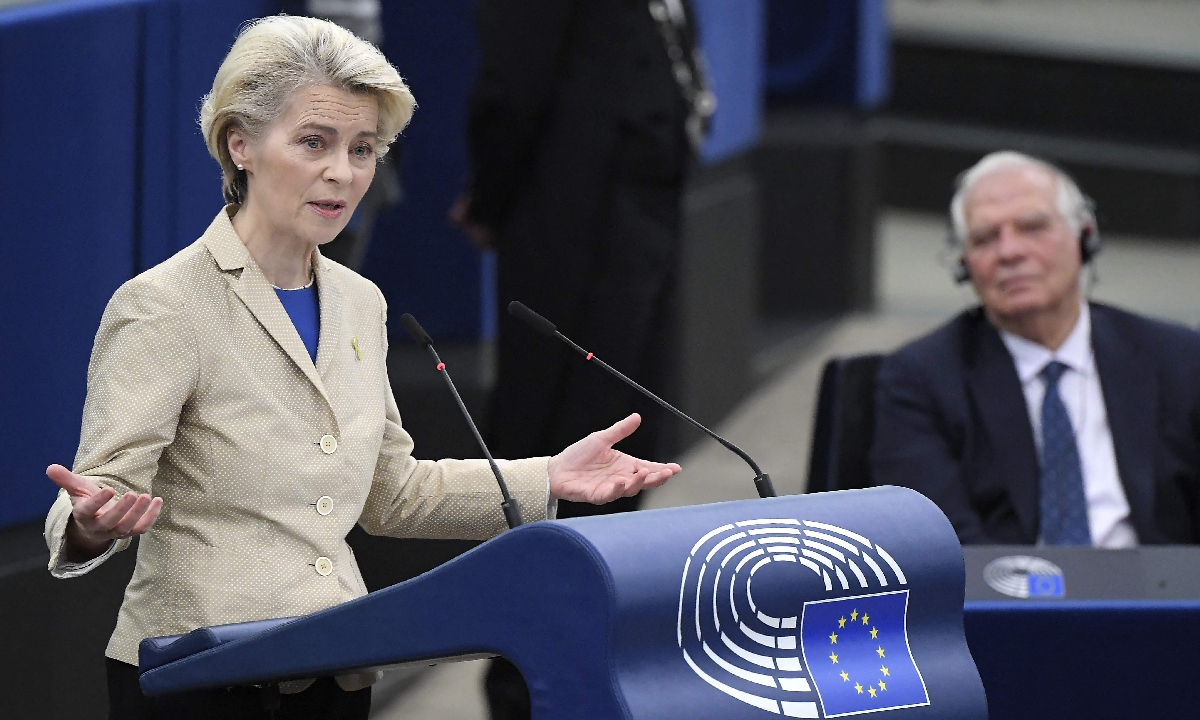
European Commission President Ursula von der Leyen (left) speaks during a debate on the results of the Russia-Ukraine conflict, as part of a plenary session at the European Parliament in Strasbourg, France, on February 15, 2023. Photo: VCG
Expanding common ground
Despite their differences, China and the EU agree on the importance of China-EU relations, share a consensus for talking and need to cooperate in a wide range of areas, Cui said.
One topic at the center of European and US media coverage of Macron and Von der Leyen's visit is the Russia-Ukraine crisis.
Citing anonymous officials, Reuters reported that Macron would put forward the EU stance in swaying China on the issue, and Russia's decision to station nuclear weapons in Belarus may give the EU a bargaining chip.
China released a 12-point position paper on the anniversary of the Ukraine crisis to advocate a political settlement, showing its sincerity and efforts in promoting an end to hostilities and negotiations between the involved parties.
Although China and the EU have a wide divergence of views on the crisis, the EU holds a positive attitude and expectations for China's capacity and willingness to play a bigger role in mediation and global security governance, Cui said.
The conditions might not be mature for peace talks at the moment, but the visit can identify China-EU common points and lay the foundation for future joint actions conducive to realizing peace and a better security architecture in Europe, the expert said.
Trade will also feature high on Macron's priorities, as he brings with him a large delegation of business leaders including representatives from EDF, Alstom, Veolia and the aerospace giant Airbus, Politico reported. The level of delegation is seen as mirroring German Chancellor Olaf Scholz's Beijing trip in late 2022.
With voices advocating "decoupling with China" rising within the bloc, the leader of a major European country leading a host of executives demonstrates how China and the EU are intertwined economically and that the decoupling approach would be neither feasible nor beneficial, analysts said.
Notably, the EU is in a difficult struggle as it is under great pressure from the US to adjust its economic relations with China. The decision by the Netherlands to restrict chip exports is one of the latest examples of Europe yielding to coercion by the US.
With a trade volume amounting to $847.3 billion in 2022, China and EU decoupling will only serve US interests, but make both China and Europe suffer. The US will not compensate the losses of what it calls its "transatlantic allies," analysts said. A wiser choice for Europe would be to take advantage of China's high-quality opening-up and grasp opportunities in China's steadfast advancement of modernization.
The European Union Chamber of Commerce in China said in a statement to the Global Times that China and Europe enjoy a strong trading relationship, and many European companies are looking for positive reform and opening-up signals from China. Specific areas of mutual interest to broader cooperation included climate change, biodiversity, WTO reform, international standards setting and alignment on digitalization, according to the statement.
Chinese observers expressed the hope and necessity that China and the EU will shoulder their global responsibilities, downplay differences and jointly contribute to global peace, stability and prosperity in a world in urgent need of certainty.



